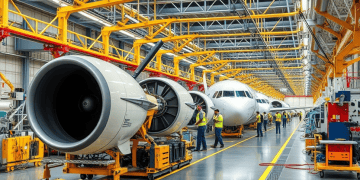PARIS (Reuters) – Airbus concluded 2024 in better financial health than previously anticipated, despite having lowered its profit targets earlier in the year. However, the company faces heightened risks from a complex and evolving international landscape.
The company reported 766 jet deliveries for the year, slightly below its target of around 770, but it remained ahead of competitor Boeing for the sixth consecutive year. Airbus acknowledged that challenges remained, including a shortfall of engines as it neared the end of 2024, but indicated that it would continue to accelerate operations in 2025.
The company also reported positive commercial results from its Airbus Defence and Space and Airbus Helicopters divisions. Despite this, the company stressed the need for further progress in defense activities. Additionally, Airbus is considering new partnerships and potential consolidations in the space sector, an area that has been a particular challenge for the company.
Airbus has also announced plans for 2,000 job cuts in its Defense and Space division, reflecting broader restructuring efforts. Industry reports have highlighted potential collaboration between Airbus, Thales, and Leonardo in the satellite sector, which could be modeled after the MBDA missile-making partnership.
Looking ahead, the company expressed concern over a deteriorating international environment, which it believes could increase risks for its operations. While specific challenges were not singled out, the broader context includes the potential impact of U.S. trade policies, with increasing protectionism expected during the second term of President Trump. The company is preparing for the possibility of stronger tariffs, especially as the U.S. administration has prioritized reducing trade deficits and addressing unfair trade practices.
Airbus also remains focused on sustainability, with CEO Guillaume Faury reiterating the company’s commitment to addressing climate change through green technology investments. The development of hydrogen-powered aircraft is a key part of this strategy, although the industry is currently prioritizing addressing jet shortages over emission reduction efforts.
Despite the challenges presented by a complex global trade environment and internal restructuring, Airbus is positioning itself to adapt and continue its competitive trajectory in the aerospace industry.
Stay informed with supply chain news on The Supply Chain Report. Learn more about international trade at ADAMftd.com.
#Airbus2024 #GlobalTradeRisks #AerospaceIndustry #TradePoliciesImpact #SustainabilityInAerospace















